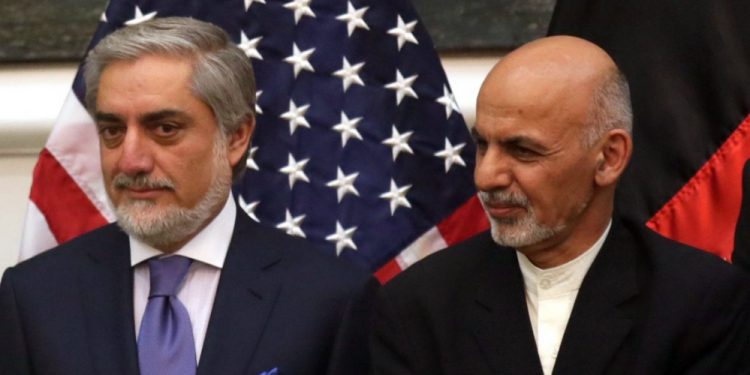Kabul: Afghanistan lurched deeper into political crisis Monday as the rivals for the country’s leadership had themselves sworn in at simultaneous ceremonies that were interrupted by at least two blasts.
The bitter feud between President Ashraf Ghani and his former chief executive Abdullah Abdullah has raised fears for Afghanistan’s fragile democracy as the US prepares to leave the country following an agreement last month with a strong and largely unified Taliban.
Polls were held in September, but repeated delays and accusations of voter fraud meant that Ghani, the incumbent president, was only declared as winner of a second term in February – sparking a furious response from Abdullah, who vowed to form his own parallel government.
Ghani, dressed in traditional Afghan clothing and white turban Monday, arrived at the presidential palace to be sworn in, surrounded by supporters, senior political figures, diplomats and foreign dignitaries including US special envoy Zalmay Khalilzad.
Minutes earlier, in another corner of the sprawling presidential palace compound, a suit-clad Abdullah inaugurated himself as president, owing to ‘safeguard the independence, national sovereignty, territorial integrity’ of Afghanistan.
As hundreds of people watched Ghani’s ceremony, two loud explosions were heard prompting some people to flee. “I have no bulletproof vest on, only my shirt,” Ghani told those who stayed behind as sirens wailed. “I will stay even if I have to sacrifice my head.”
Many of those who fled return to their seats after Ghani’s refusal to leave the podium prompted cheers and applause.
The game of thrones has strained the patience of the international community and Afghans alike, with Washington warning earlier that the bickering posed a risk to the US withdrawal deal, which requires the Taliban to hold talks with Kabul.
The row has left many Afghans despairing for their country’s future. “It is impossible to have two presidents in one country,” said Ahmad Jawed, 22, who urged the men ‘to put their personal interests aside and only think of their country instead of fighting for power’.
Afghans have shown little enthusiasm for Abdullah, Ghani or the election process in general. Most of them abstained in last year’s lacklustre poll that saw candidates pitch few ideas or policies.
Unemployment is high, and even university graduates like Jawed are struggling to find work, while violence has continued unabated, except for during a week-long partial truce ahead of the US-Taliban deal.
The Taliban, who have slammed the electoral process as ‘a fake and foreign-run’ affair, have also ramped up attacks on Afghan forces and civilians.
PTI






































